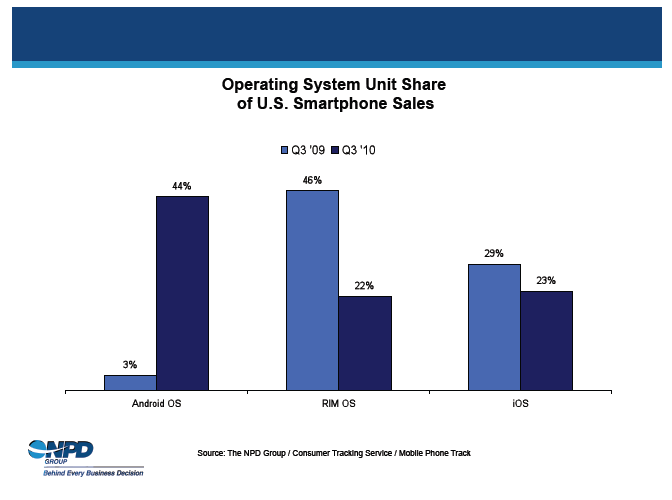Android: RIM's worst nightmare

The data points on Android market share keep coming and the story is the same: Google's mobile operating system is gaining share at a rapid clip. However, most of those share gains are coming at Research in Motion's expense. Android is quickly becoming RIM's worst nightmare.
First, Canalys reports that devices running Android had 44 percent of the U.S. smartphone market in the third quarter. Apple also ousted RIM from the top spot with 26 percent market share. NPD's figures show more Android domination---the OS was installed on 44 percent of all smartphones in the third quarter, up 11 percent from the second quarter.
NPD has Apple's iOS rising a point to 23 percent. RIM fell to third from 28 percent to 22 percent.
But here's the money quote from NPD analyst Ross Rubin:
Much of Android’s quarterly share growth came at the expense of RIM, rather than Apple. The HTC EVO 4G, Motorola Droid X, and other new high-end Android devices have been gaining momentum at carriers that traditionally have been strong RIM distributors, and the recent introduction of the BlackBerry Torch has done little to stem the tide.
And graphically speaking here's RIM's situation:
Now if Apple lands at Verizon perhaps the Android onslaught is slowed a bit. But none of that will matter for RIM, which is systematically being crowded out of Verizon.
So now we have the following situation for RIM:
- The Torch is the lead RIM device, but it's only at AT&T;
- RIM would need a dozen new smartphones to even come close to matching the Android tide;
- Android devices are eyeing the enterprise too;
- RIM's Playbook is an unknown commodity at the moment.
It's not totally dire for RIM, but it's unclear what it can do to turn things around. It has already launched its new operating system.
